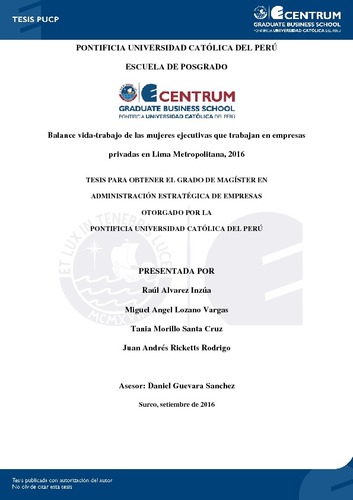| dc.contributor.advisor | Guevara Sánchez, Daniel Eduardo | |
| dc.contributor.author | Alvarez Inzúa, Raúl | |
| dc.contributor.author | Lozano Vargas, Miguel Ángel | |
| dc.contributor.author | Morillo Santa Cruz, Tania Elena | |
| dc.contributor.author | Ricketts Rodrigo, Juan Andrés | |
| dc.date.accessioned | 2016-11-28T21:06:00Z | |
| dc.date.available | 2016-11-28T21:06:00Z | |
| dc.date.created | 2016 | |
| dc.date.issued | 2016 | |
| dc.identifier.uri | http://hdl.handle.net/20.500.12404/7524 | |
| dc.description.abstract | La presente investigación tiene como objetivo describir cómo las mujeres ejecutivas que trabajan en empresas privadas de Lima Metropolitana tienden al balance vida-trabajo y cómo se presenta esta tendencia en las diversas áreas de sus vidas.
Se trata de un estudio cuantitativo, descriptivo, transeccional no experimental, que emplea el instrumento de la encuesta, adaptado del estudio de Balance vida trabajo de las mujeres gerentes que trabajan en empresas privadas del área metropolitana de Caracas realizado por Salgado (2011) y diseñado para medir nueve dimensiones de la vida de la mujer. Estas dimensiones brindarán información sobre la tendencia al balance vida-trabajo de las mujeres ejecutivas. El tamaño de la muestra fue de 227 mujeres ejecutivas de Lima Metropolitana. Esta se aplicó a aquellas mujeres que tenían un cargo de alta responsabilidad, de mando medio o jefaturas que laboraban en empresas privadas
Los resultados de la investigación concluyen que las mujeres ejecutivas tienden al balance en las dimensiones física, familiar y conciliación. Las estrategias realizadas por la mayoría de ejecutivas para lograr una tendencia al balance son: asistir a sus controles médicos, administrar su hogar, recibir el apoyo de un familiar o una tercera persona para al cuidado de sus hijos o de personas dependientes, brindar tiempo al cuidado de sus hijos y gestionar el acceso a días libres por motivos familiares. Sin embargo, se identificó también que en las áreas laborales y políticas conciliadoras no se puede determinar una tendencia al balance. Los ítems o factores más relevantes en donde se debería realizar acciones de mejora son: trabajar ocho horas diarias como máximo, solicitar a la empresa donde labora permisos para realizar trabajos en el domicilio, requerir a la empresa donde labora beneficios adicionales a los obligados por ley | es_ES |
| dc.description.abstract | This research aims to describe how executive women who work in private companies from Lima Metropolitan Area tend to life-work balance and how this tendency is presented in the different areas of women’s life This is a quantitative, descriptive and non-experimental transactional research done in this study which uses the survey instrument, adapted from the study of life-work balance of women managers from Caracas that was written by Salgado (2011) and it was designed to measure nine dimensions of women´s life. These dimensions will give information about the tendency to achieve life-work balance of executive women. The study was applied in a sample of 227 executive women of Lima. This also applied to women who hold high-ranking posts, senior posts or department heads form private enterprises.
The results or research conclude that executive women tend to balance in the physical, familiar and conciliation dimensions. The strategies that use the majority of executives to achieve a tendency into balance are: to assist to medical controls, home administration, to get support from a family member or a third person in order to take care their children or depended people, to give time in order to take care the children and to manage the access to free days because family reasons. However, this study also identified that in the labour and conciliatory policies the tendency of balance can´t be determined. The more relevant items or factors in which improvements must be done are: to work eight hours per day, to ask permissions to the companies in order to work more frequently at home, to require to the companies additional employment benefits besides the obligations established in corporate law | es_ES |
| dc.language.iso | spa | es_ES |
| dc.publisher | Pontificia Universidad Católica del Perú | es_ES |
| dc.rights | info:eu-repo/semantics/openAccess | es_ES |
| dc.rights.uri | http://creativecommons.org/licenses/by-nc-nd/2.5/pe/ | * |
| dc.subject | Mujeres ejecutivas--Perú--Lima | es_ES |
| dc.subject | Mujeres--Trabajo--Perú | es_ES |
| dc.subject | Actitud (Psicología) | es_ES |
| dc.subject | Investigación cuantitativa | es_ES |
| dc.title | Balance vida-trabajo de las mujeres ejecutivas que trabajan en empresas privadas en Lima Metropolitana, 2016 | es_ES |
| dc.type | info:eu-repo/semantics/masterThesis | es_ES |
| thesis.degree.name | Magíster en Administración Estratégica de Empresas | es_ES |
| thesis.degree.level | Maestría | es_ES |
| thesis.degree.grantor | Pontificia Universidad Católica del Perú. CENTRUM | es_ES |
| thesis.degree.discipline | Administración Estratégica de Empresas | es_ES |
| renati.discipline | 413307 | es_ES |
| renati.level | https://purl.org/pe-repo/renati/level#maestro | es_ES |
| renati.type | https://purl.org/pe-repo/renati/type#tesis | es_ES |
| dc.publisher.country | PE | es_ES |
| dc.subject.ocde | https://purl.org/pe-repo/ocde/ford#5.02.04 | es_ES |






